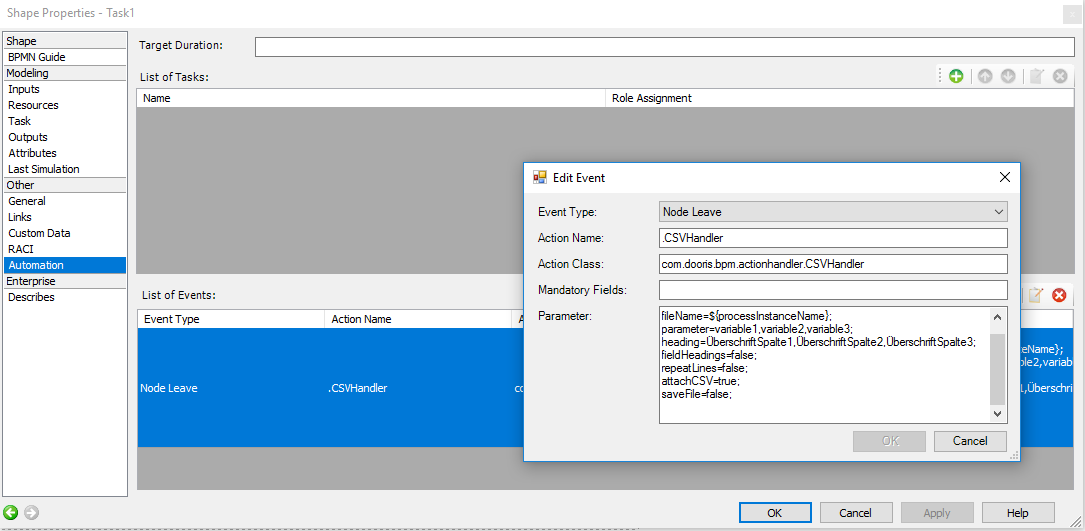Table of Contents
 This page is not fully translated, yet. Please help completing the translation.
This page is not fully translated, yet. Please help completing the translation.
(remove this paragraph once the translation is finished)
CSVHandler
Description
The CVS handler allows variables from a process to be written to a CSV file/table. They may then be attached or saved.
Action Class
com.dooris.bpm.actionhandler.CSVHandler
Event Type
any
Action Name
any
Mandatory Fields
none
Parameter
filePath
Describes where the file should be stored. This may be either a relative or an absolute path. Caution: The file will only be saved if the parameter saveFile is set to 'true'.
fileName
Describes how the files being attached/saved are to be named. This may be entered explicitly or as a variable. To name the file as a variable, the following structure must be used: ${VARIABLE} Multiple variables may also be used.
parameter
Names of the variables being transferred to the table. The variables are separated by commas. Every variable is written to a new column.
heading
Names of the headings or the first row in the table. As with the parameters, these are also separated by commas.
Note the parameter fieldHeadings : if this is set to false, the declarations are used directly for the heading. If set to true, the declarations will be considered as process variables and taken from the database.
fieldHeadings
Boolean (true/false). Set to false by default. When set to false, the values are taken directly from the heading. If set to true, the values are considered as process variables and translated.
repeatLines
Boolean (true/false). Set to false by default. If repeatLines is set as false, then the variables being passed by 'parameter' are searched for directly and written to a row in the file. If repeatLines is set as true, the parameters will be searched for multiple times, in accordance with the following template: variable1[0];variable2[0];variable3[0]. Square brackets with a number are attached to the passed parameter (for an example, see domrepeater). The number in the brackets is incrementally increased until no more suitable variables are found. All variables with the same index are displayed in the same new line.
Neither the bracket nor the index contained in the bracket have to be passed by 'parameter'; only the introduced variable name is needed.
attachCSV
Boolean (true/false). This is set to true by default, meaning that the file is attached to the process instance and with the denoted name. This may then be attached, for example, to an e-mail. If set to false, the file will not be attached to the process instance.
saveFile
Boolean (true/false). This is set to true by default, meaning that the file will be saved in the given path and with the denoted name. If set to false, the file will not be saved.
Example

